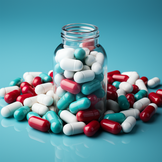What is the medical name and drug classification of viagra?

Viagra, whose medical name is sildenafil, is a medication commonly used to treat erectile dysfunction (ED) and pulmonary arterial hypertension (PAH). Belonging to the class of drugs known as phosphodiesterase-5 (PDE5) inhibitors, Viagra has proven to be a critical medical intervention for many patients around the world.
The recommended dosage for Viagra depends on a number of factors, including the severity of the condition being treated, the patient's medical history, and their tolerance to the drug. Typically, the starting dose is 50 mg, which can be adjusted up to 100 mg or down to 25 mg depending on efficacy and tolerability. It's essential for patients to follow their healthcare provider's prescription guidelines to ensure safe and effective use of Viagra.
Viagra is commercially available in three dosage strengths: 25 mg, 50 mg, and 100 mg. The appropriate dosage for an individual depends on the clinical need and the patient's response to the medication. Careful dose titration under a healthcare provider's guidance can help optimize the therapeutic effect while minimizing potential side effects.
Viagra has demonstrated effectiveness in treating PAH. This condition involves high blood pressure in the arteries that supply the lungs. By inhibiting phosphodiesterase type-5, the drug helps relax the arterial wall, reducing pulmonary arterial resistance and pressure. This results in an improvement in oxygen supply to the heart and reduces its workload.
While Viagra is perhaps the most well-known brand name for sildenafil, it is also marketed under various other brand names globally.
These include Aronix, Liberize, Nipatra, Revatio, and Grandipam.
The choice of brand may depend on various factors, including availability, cost, and patient preference.
Viagra's main function is to manage ED. It does this by inhibiting phosphodiesterase-5 (PDE5), an enzyme found predominantly in the vascular smooth muscle of the corpus cavernosum of the penis. This inhibition allows for the relaxation of these smooth muscles, which facilitates the inflow of blood and consequently aids in the achievement and maintenance of an erection.
Viagra belongs to a class of drugs known as phosphodiesterase-5 (PDE5) inhibitors. These drugs work by blocking the action of PDE5, thereby increasing the levels of a chemical known as cyclic guanosine monophosphate (cGMP) in the body. This results in the relaxation of blood vessels and an improved blood flow, aiding in the treatment of ED and PAH.
Viagra is a potent medication with potential drug interactions. Certain drugs, including some types of antifungal medicines and HIV medications, can interact with Viagra, leading to increased side effects or reduced effectiveness. As such, it's essential for patients to discuss all current medications and health conditions with their healthcare provider before starting Viagra. Additionally, while it is available over the counter in some countries, it is important to remember that Viagra should always be used under the supervision of a healthcare professional.
To answer the related questions: The generic name for Viagra is sildenafil. As for the medical classification, Viagra belongs to the drug class of phosphodiesterase-5 (PDE5) inhibitors. Viagra and Cialis, another popular ED drug, belong to the same class. Side effects of Viagra may include headaches, flushing, upset stomach, abnormal vision, and in rare cases, priapism (a prolonged and painful erection). Always consult with a healthcare provider for advice about potential side effects and their management.



